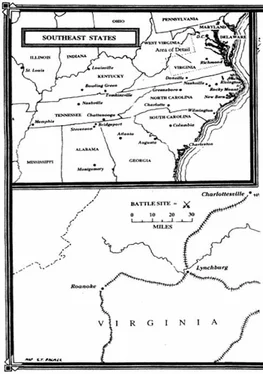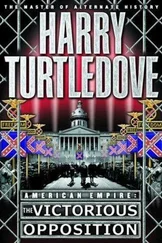Harry Turtledove - The Guns of the South
Здесь есть возможность читать онлайн «Harry Turtledove - The Guns of the South» весь текст электронной книги совершенно бесплатно (целиком полную версию без сокращений). В некоторых случаях можно слушать аудио, скачать через торрент в формате fb2 и присутствует краткое содержание. Год выпуска: 1992, ISBN: 1992, Издательство: Ballantine, Жанр: Альтернативная история, на английском языке. Описание произведения, (предисловие) а так же отзывы посетителей доступны на портале библиотеки ЛибКат.
- Название:The Guns of the South
- Автор:
- Издательство:Ballantine
- Жанр:
- Год:1992
- ISBN:0-345-38468-7
- Рейтинг книги:4 / 5. Голосов: 1
-
Избранное:Добавить в избранное
- Отзывы:
-
Ваша оценка:
- 80
- 1
- 2
- 3
- 4
- 5
The Guns of the South: краткое содержание, описание и аннотация
Предлагаем к чтению аннотацию, описание, краткое содержание или предисловие (зависит от того, что написал сам автор книги «The Guns of the South»). Если вы не нашли необходимую информацию о книге — напишите в комментариях, мы постараемся отыскать её.
The Guns of the South — читать онлайн бесплатно полную книгу (весь текст) целиком
Ниже представлен текст книги, разбитый по страницам. Система сохранения места последней прочитанной страницы, позволяет с удобством читать онлайн бесплатно книгу «The Guns of the South», без необходимости каждый раз заново искать на чём Вы остановились. Поставьте закладку, и сможете в любой момент перейти на страницу, на которой закончили чтение.
Интервал:
Закладка:
“Gentlemen,” Lee said, extending his hand.
They came up one by one to shake it.” An honor to meet the great General Lee,” Ernie Graff said. He was about Lee’s height, and wore a neat, sandy chin-beard, which only partially hid a scar that ran up to the angle of his jaw. As Major Venable had noted, he and the rest of the men in mottled clothes spoke with the same not-quite-British accent as Rhoodie, and the same harsh undertone—if anything, that was stronger in his voice than in Rhoodie’s.
“You needn’t say my name as if you’d found it in some history book, sir,” Lee protested mildly. All of Rhoodie’s comrades smiled or laughed at that, rather more than the small joke deserved. Even so, Lee was pleased to put them at their ease.
“General Stuart is the man I want to meet,” said the one who had been introduced as Konrad de Buys. Most of the strangers had a businesslike look to them, but de Buys’s tawny eyes held a gleam that reminded Lee of a cougar. This man fought for the joy of it.
Then Lee remembered how Rhoodie rode. De Buys would have to do better than that to satisfy Jeb Stuart. “You are a horseman, sir?” Lee asked. De Buys nodded in a way that left no doubt. Lee said, “Then I am certain General Stuart will be pleased to make your acquaintance as well. Colonel Mosby also, perhaps, with his partisan command.” By the way de Buys grinned, Lee knew he had judged his man aright.
“General Stuart is by—Fredericksburg?” Wilhelm Gebhard asked.
He turned the soft g of general hard, as a German might have. Behind Lee, one of his aides whispered “Dutchmen” to another. Lee guessed it was Marshall; he seemed most dubious of Rhoodie, and the bulk of Germans in America—including a good many who lived in the Confederacy—were Unionists.
But these men were far too open—and far too strange—to be spies, and in any case, General Meade knew where the Army of Northern Virginia’s cavalry was passing the winter. “Yes, around Fredericksburg,” Lee answered. He would sooner have had Stuart’s troopers closer to hand, but getting horses through the winter was harder and required more land than men did.
Gebhard turned to Rhoodie, asked him something in a language that sounded close to English but was not. Rhoodie replied in the same tongue. Dutchmen they are, Lee thought, In English, Rhoodie said, “He wants to know whether he and de Buys should arrange to go to Fredericksburg to show off our guns, or whether you will call General Stuart here.”
Lee thought about that. At last he said, “With the cavalry spread out on the countryside as it is, the more efficient course would appear to be convening General Stuart and his divisional and brigade commanders here at Orange Court House so they can judge your repeaters for themselves.”
“Fine,” Rhoodie said. “When we shoot, though, better we go back up to your headquarters, to keep word of what these guns can do from reaching the enemy.”
“A sensible plan,” Lee agreed.
Talking to himself as much as to Lee, Rhoodie went on, “Since this will be the center from which we give out guns to your army, we ought to rent quarters here, and warehouse space, too. We have a lot of work to do before spring, getting your men ready.”
“The officers of the Army of Northern Virginia should prove of some assistance to you,” Lee said drily.
Irony bounced from Andries Rhoodie like solid shot off an ironclad’s armored hull. He looked Lee full in the face and said, “Some will help us, General; I don’t doubt it. But if I were on the other side of the Rapidan and dealing with the Federals, say with General Burnside or General Sigel, they might not even have given me a hearing. They have their Springfields, after all, and once a routineer settles in with something, it’s hard to boot him loose from it.”
“You will be treating with better men in this army than the two you named,” Lee said. “I should certainly hope so, at any rate.”
“You vouch for every brigadier, every colonel?” Rhoodie persisted. “My comrades and I haven’t enough manpower to do more than show the basics of how to shoot and clean the AK-47, regiment by regiment. Getting your soldiers to use it afterwards will be up to those commanders. Some of them will mistrust anything new and different.”
“I see what you are saying, sir,” Lee admitted. There was some truth to it, too. The Confederate States themselves had banded together in the hope of preserving their old way of life against the growing numbers and growing factories of the North. But here—”You get my men these repeaters, Mr. Rhoodie, and I shall undertake to see they are used,”
“That’s what I wanted to hear, General Lee.”
“You have heard it.”
Singing as they worked, slaves carried long crates with rifles in them and square crates of ammunition out of the freight cars and stacked them beside the railroad tracks. The stacks grew higher and higher and higher.
* II *
“What else, Alsie?” First Sergeant Nate Caudell asked patiently.
Private Alsie Hopkins furrowed his brow, as well as a man in his early twenties could. “Tell ‘em I feel good,” he said at last. “Tell ‘em the arm where I got shot at Gettysburg don’t hurt no more, and the diarrhea ain’t troublin’ me, neither.”
Caudell’s pen scratched across the page. Actually, it wasn’t a proper page, but the back of a piece of old wallpaper. He wrote around a chunk of paste that still clung to it. He was sure he wrote more letters than anyone else in Company D—maybe more than anyone else in the whole 47th North Carolina. That went with being a schoolteacher in a unit full of farmers, many of whom—like Alsie Hopkins—could neither read nor write for themselves.
“What else, Alsie?” he asked again.
Hopkins thought some more. “Tell ‘em we had us a rip-roarin’ snowball fight the other day, and one feller, he got two teeth knocked out of his head when he got hit with a snowball with a rock in the middle of it. We all laughed and laughed.”
“Except the man who got hit,” Caudell said drily.
“No, him too.”
Caudell thought that likely to amuse Hopkins’s family, so he started to write it down. Just then, though, a bugle call came through the open shutters of his cabin’s single window. He put down his pen. “Have to finish this another time, Alsie. That’s assembly for officers, sergeants, and corporals.”
“Everybody but us privates,” Hopkins said, happy at the prospect of his superiors working when he didn’t have to. “Can I leave this paper here, First Sergeant, and we get it done maybe some time later on?”
“I suppose so,” Caudell said resignedly. His battered felt slouch hat lay beside him on the bed. He put it on, got to his feet. “I’ve got to go now, though.”
He and Hopkins ducked out through the cabin’s low door. With nothing better to do, the private ambled away. Caudell hurried up the lane that ran through the cabins and lean-tos and tents of the regiment’s winter quarters. His cabin, which he shared with the other four sergeants of Company D, lay farthest from the open space at the center of the encampment. Closest to that open space was Captain Lewis’s tent; being captain, he had it all to himself. The company banner stood beside it, the words CASTALIA INVINCIBLES picked out in red silk on a blue ground, pierced by more than one bullet hole.
Men with chevrons or collar badges converged on the parade ground. They did not begin to fill it up; they were perhaps one part in seven of the six-hundred-odd soldiers who regularly drilled there.
Along with all the officers and noncommissioned officers was one private: Ben Whitley of Company A. As usual, the teamster perched on his wagon. With him sat another man, a stranger, whose cap, coat, and trousers looked to be made of nothing but patches, some the color of dirt, some of grass, some of mud. Slung on the stranger’s back was a carbine of unfamiliar make.
Читать дальшеИнтервал:
Закладка:
Похожие книги на «The Guns of the South»
Представляем Вашему вниманию похожие книги на «The Guns of the South» списком для выбора. Мы отобрали схожую по названию и смыслу литературу в надежде предоставить читателям больше вариантов отыскать новые, интересные, ещё непрочитанные произведения.
Обсуждение, отзывы о книге «The Guns of the South» и просто собственные мнения читателей. Оставьте ваши комментарии, напишите, что Вы думаете о произведении, его смысле или главных героях. Укажите что конкретно понравилось, а что нет, и почему Вы так считаете.












